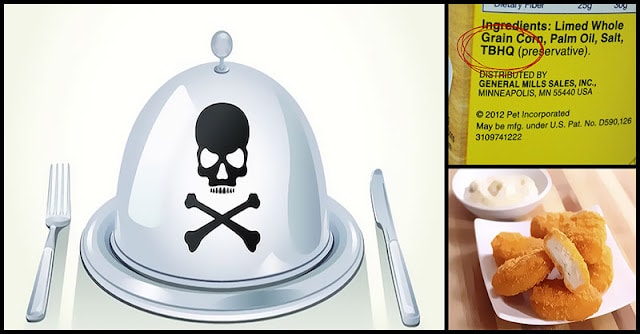A few years ago, a popular health blogger began exposing the possible dangers of a food ingredient called tBHQ, which is also known as tertiary butylhydroquinone, tert-Butylhydroquinone or t-butyl hydroquinone. This has been found in a large number of foods and has the potential to promote cancer formation, according to the Center for Science in the Public Interest.
What Is tBHQ?
The National Institute of Health’s (NIH) official definition of tBHQ is:
t-Butylhydroquinone is a white to tan, crystalline powder. It has a very slight odor. t-Butylhydroquinone is very soluble in water. t-Butylhydroquinone is used as an antioxidant in food (EAFUS) and cosmetics and as a chemical stabilizer. It is also an inert ingredient in some ant and roach insecticides.
tBHQ is the one that stops the oxidation of molecules in food, thus stopping them from going rancid or rotten.
The unhealthier fats you eat, the more tBHQ you’ll consume. You’ll probably consume the most tBHQ if you are on low-carb diets that consume lots of fats with minimal nutritive value.
tBHQ is a man-made compound that starts as hydroquinone, which is an agent used in the photographic development and for reducing silver, and then has a tertiary butyl group added to its molecular structure.
This compound is not naturally occurring and shares the same molecular structures with other butyl molecules, just like those found in the lighter fluid.
Some of the foods that contain tBHQ are:
- Soy milk brands
- Processed fats and oils like Canola Oil
- Soft drinks Cooking and frying oil at many restaurants (particularly fast food)
- Frozen, non-organic fish products
- Most non-organic, packaged foods
- It’s not just food that contains tBHQ. Other products with tBHQ are:
- Cosmetics like hair dye, lipstick, and eyeshadow (probably not listed on the label)
- Lacquers, resins, and varnishes
- Some pet food varieties
Dangers Of tBHQ
Potentially Promotes Cancer
In an animal test, tBHQ causes some cancerous or pre-cancerous effects. It may also increase resistance to chemotherapy drugs and help cancer cells live longer.
Could Cause Neurological Symptoms
Various neurological symptoms related to tBHQ consumption has been recorded by the National Institute of Health. These symptoms include convulsions, vision disturbances, and medullary paralysis which is a stage of paralysis wherein the medulla (part of the brain that controls breathing and vital bodily processes) is slowed.
Can Cause Allergic Contact Dermatitis
tBHQ can cause issues with skin as it has been found in many cosmetics and other products you may use or touch. There were reports found that people have developed allergic dermatitis from tBHQ, particularly in cosmetics. This reaction may also be related to cross-reactions with BHA and BHT.
Could Lead To Food Allergies
The tBHQ’s potential to induce or worsen food allergies is possibly one of its most recent dangers.
Cheryl Rockwell, Ph.D., a researcher at Michigan State University, has been conducting research in immunology and how tBHQ interacts with immunity. Her team discovered many of its immune damaging effects which could possibly promote food allergies.
One of their abstract states likes this:
“Overall, these studies suggest that low doses of the food additive, tBHQ, increase IgE response to food allergen and exacerbate clinical signs of immediate hypersensitivity.”
Might Damage Immunity
tBHQ inhibits some of the immune responses that help your body fight disease. This preservative activates Nrf2, a protein that controls antioxidant function. It causes Nrf2 to negatively interact with proteins that control immune responses, such as white blood cell function.
tBHQ may hinder immune-supporting processes in the body, thereby damaging the function of your immune system, and cause you to be more vulnerable to disease or illness.
May Cause Damage To Red Blood Cells
There is a possibility that tBHQ may damage the structure of red blood cell membranes. The researchers in a lab study concluded that “deleterious effects on other biological membranes are also likely to occur.”
How To Avoid tBHQ
You can reduce any problematic symptoms tBHQ might have caused once you stop being exposed to it.
Choose natural substitutes that have more antioxidant activity than tBHQ as well as don’t carry side effects like their synthetic counterparts.
Some of the natural antioxidants to use instead of tBHQ include:
- Green tea extracts
- Olive Extracts
- Citrus extract
- Cinnamon oil
- Clove oil
- Chinese cinnamon extract
- Rosemary extract and Rosemary Oil
- Broccoli sprout extract
- Sesame oil extracts
- Sunflower oil extract
Eliminate foods that are known to contain TBHQ. You will bump up your overall health if you get rid of processed foods, fast food, unhealthy oil/ fats, and sodas.
Make changes all at once by starting making easy substitutions. Use avocado oil, ghee oil, or coconut oil for high-heat cooking at home. Fill your plate with more whole, non-packaged foods and opt for organic when you can feasibly do so. Lastly, treat your self with sparkling water rather than of soda.









